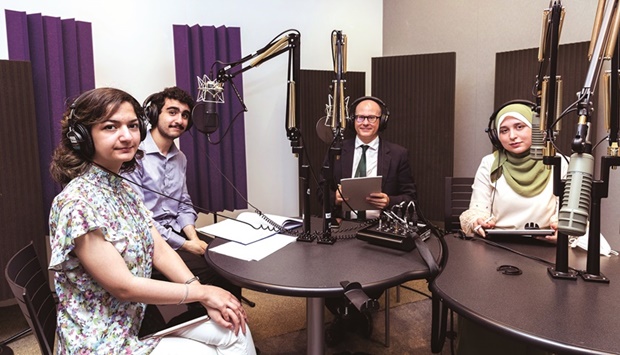Students at Weill Cornell Medicine-Qatar (WCM-Q) have launched a project to record a selection of poetry and book readings in five languages to be enjoyed by people with visual impairments.
The WCM-Q students recorded readings of poems in Arabic, English, French, Romanian and Urdu in the professional studios of Northwestern University in Qatar with technical support from Innovations Stations staff of the AV room at Qatar National Library.
The recordings span a broad range of genres, encompassing classical poems, love poems, poems with a medical theme, and Arabic poetry, including works by Al-Mutanabbi, widely regarded as the greatest Arabic-language poet of the Islamic Golden Age.
All of the recordings have been contributed to Librivox, a voluntary organisation that produces free-to-access audiobooks for people with visual impairments, which are available online.
To date, the students have recorded and contributed 13 collections of poems and books, and they continue to record and upload more works through the project, which remains ongoing.
“The project began as a humanitarian initiative, aiming to provide visually impaired people access to a wide assortment of spoken poetry and books so that they have the same access to literature as any other member of the community,” said medical student Maryam Arabi, a member of WCM-Q’s Class of 2026 and project manager of the initiative.
“Literature is a gateway to creativity, learning, and self-growth, and should therefore be readily available to everyone. As medical students, we find that medicine and literature are very intertwined, in that both doctors and poets must be able to understand, describe, and deal with people’s feelings and suffering.”
The other WCM-Q students who have recorded readings are Amr Ahmed, Nuran Bayraktar, Safaa Elmoh, Sara Mohamed, Aisha Serpedin, Ahamed Lebbe, Bushra Alfakhri, Ahmad Altamimi, Imane Bouhali, Farha Sheikh and Esha Subhash.
Dr Alan Weber, professor of English at WCM-Q, who is the developer and project leader of the initiative, said: “The project, which originated in my 2019 course on medical humanities, was designed to teach students professional voice production and public speaking skills critical to their future roles as doctors. In addition, students engaged in service learning, and expanded their cultural competency through poetry, an art which illuminates psychology, culture, language, and history.”
The recordings span a broad range of genres, encompassing classical poems, love poems, poems with a medical theme, and Arabic poetry, including works by Al-Mutanabbi, widely regarded as the greatest Arabic-language poet of the Islamic Golden Age.
All of the recordings have been contributed to Librivox, a voluntary organisation that produces free-to-access audiobooks for people with visual impairments, which are available online.
To date, the students have recorded and contributed 13 collections of poems and books, and they continue to record and upload more works through the project, which remains ongoing.
“The project began as a humanitarian initiative, aiming to provide visually impaired people access to a wide assortment of spoken poetry and books so that they have the same access to literature as any other member of the community,” said medical student Maryam Arabi, a member of WCM-Q’s Class of 2026 and project manager of the initiative.
“Literature is a gateway to creativity, learning, and self-growth, and should therefore be readily available to everyone. As medical students, we find that medicine and literature are very intertwined, in that both doctors and poets must be able to understand, describe, and deal with people’s feelings and suffering.”
The other WCM-Q students who have recorded readings are Amr Ahmed, Nuran Bayraktar, Safaa Elmoh, Sara Mohamed, Aisha Serpedin, Ahamed Lebbe, Bushra Alfakhri, Ahmad Altamimi, Imane Bouhali, Farha Sheikh and Esha Subhash.
Dr Alan Weber, professor of English at WCM-Q, who is the developer and project leader of the initiative, said: “The project, which originated in my 2019 course on medical humanities, was designed to teach students professional voice production and public speaking skills critical to their future roles as doctors. In addition, students engaged in service learning, and expanded their cultural competency through poetry, an art which illuminates psychology, culture, language, and history.”

